Abstract
Patients with acquired hypogammaglobulinaemia usually have near normal numbers of B cells and normal T cell function. When hypogammaglobulinaemia occurs in association with thymoma, then B cell numbers have been reported as low, and distinctive T cells are present which inhibit immunoglobulin production by normal cells. It has been suggested that these T cells are responsible for the observed hypogammaglobulinaemia. We report a patient with thymoma and hypogammaglobulinaemia who lacks these distinctive suppressor cells and has normal B cell numbers. It is therefore incorrect to propose a single pathogenic mechanism for hypogammaglobulinaemia in association with thymoma.
Full text
PDF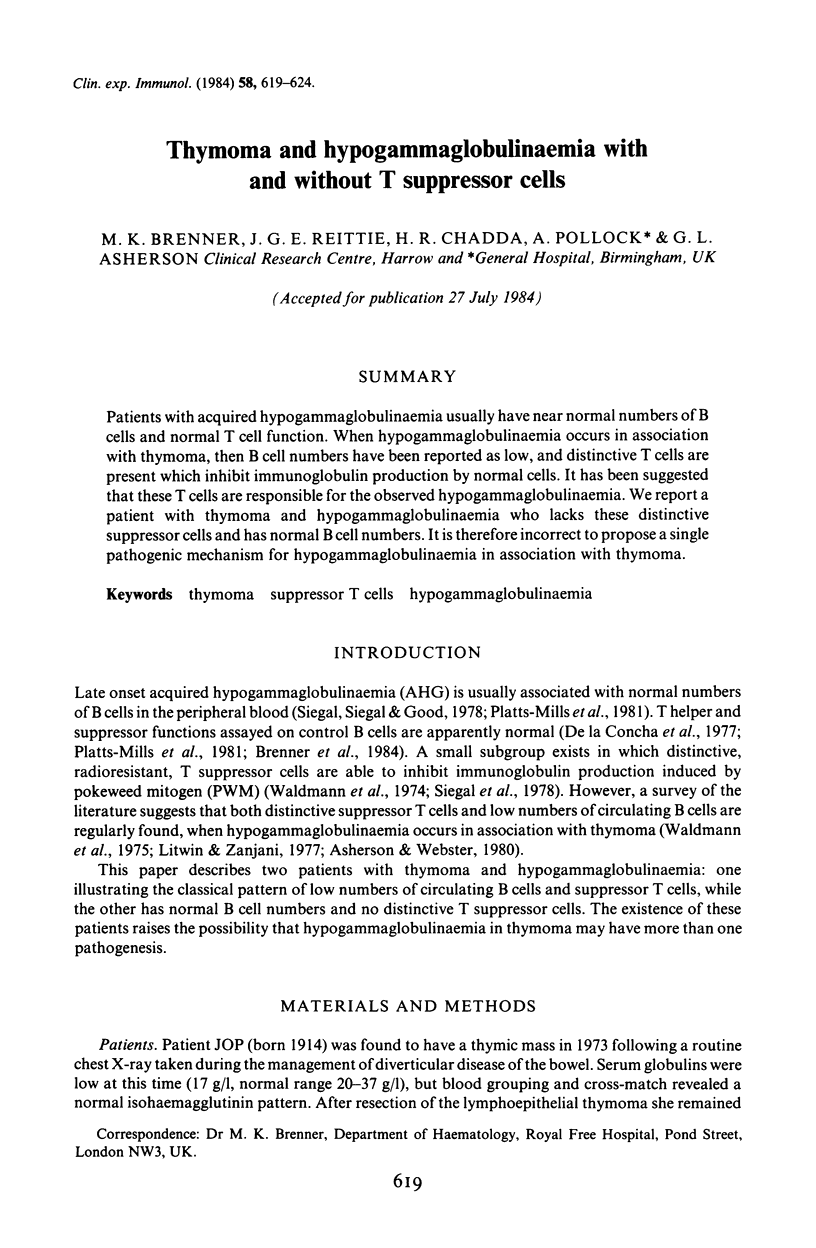
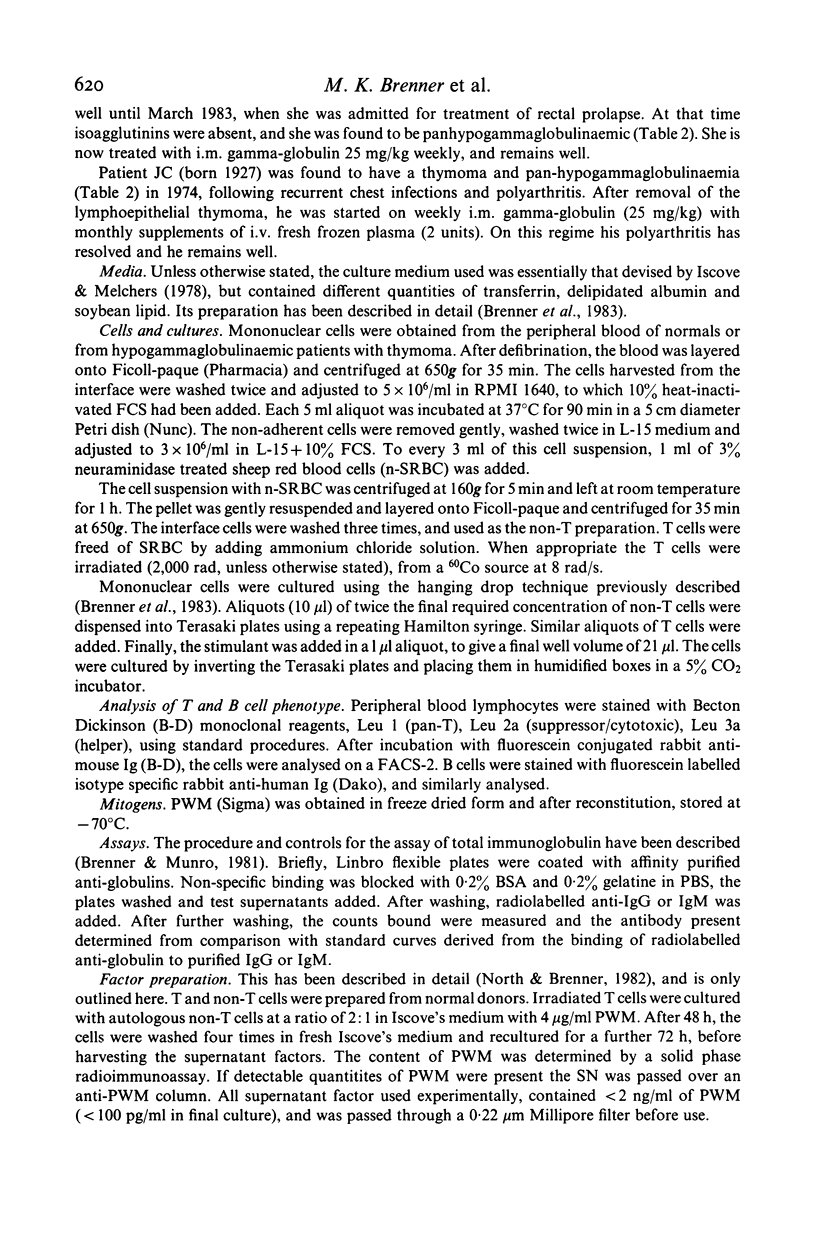
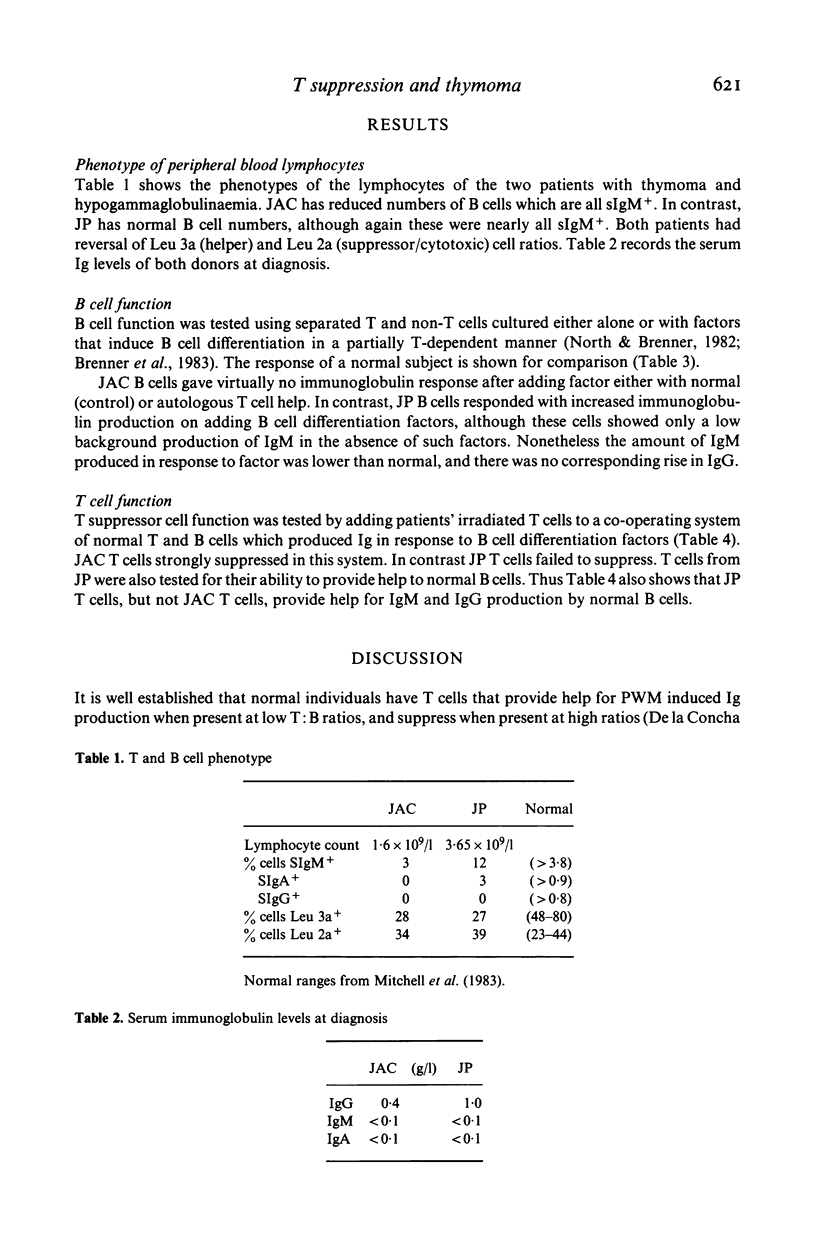
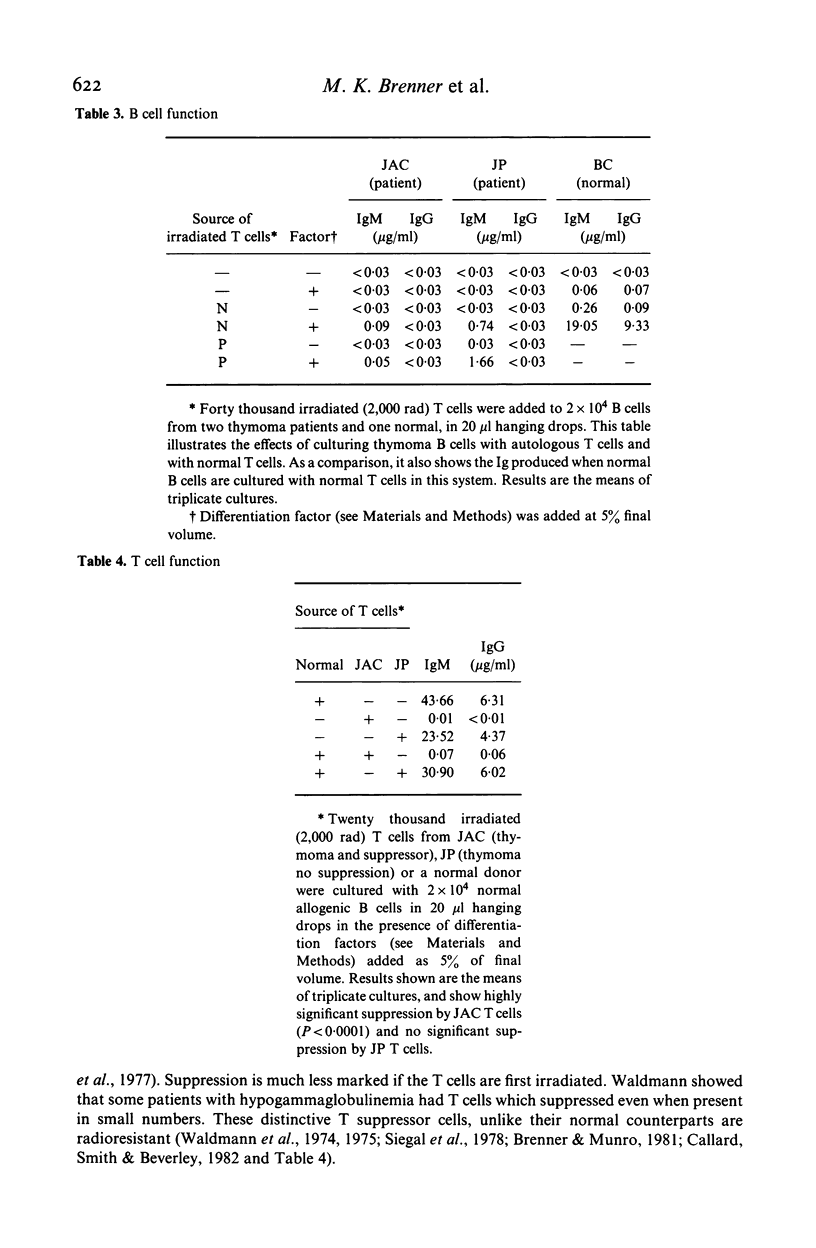
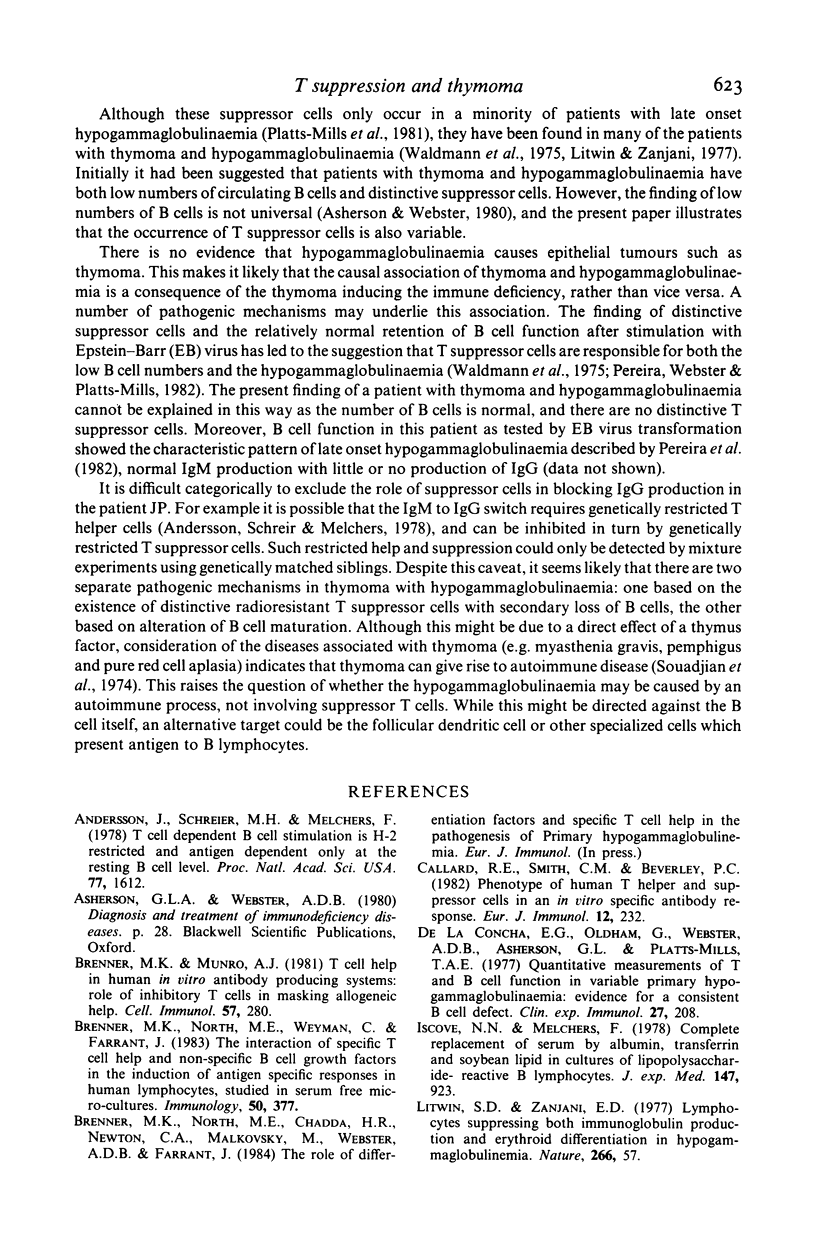
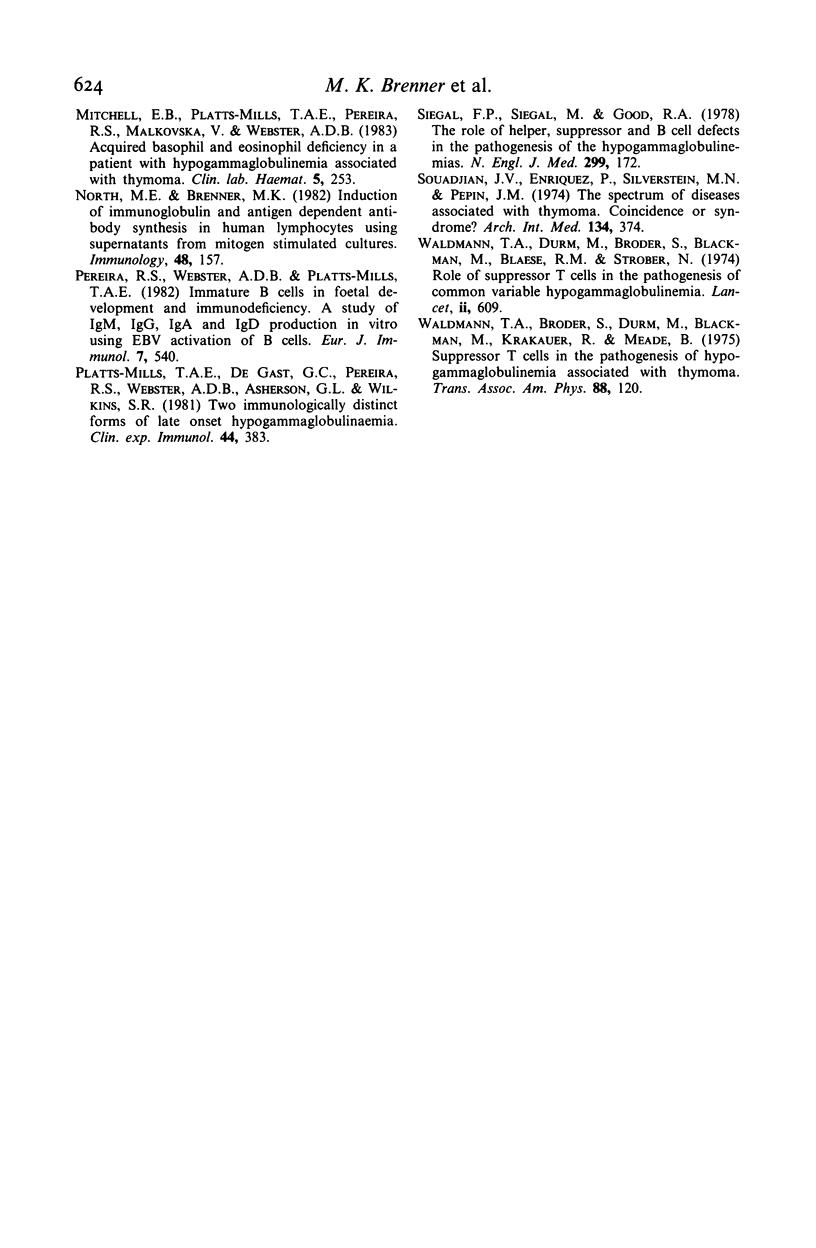
Selected References
These references are in PubMed. This may not be the complete list of references from this article.
- Andersson J., Schreier M. H., Melchers F. T-cell-dependent B-cell stimulation is H-2 restricted and antigen dependent only at the resting B-cell level. Proc Natl Acad Sci U S A. 1980 Mar;77(3):1612–1616. doi: 10.1073/pnas.77.3.1612. [DOI] [PMC free article] [PubMed] [Google Scholar]
- Brenner M. K., Newton C. A., North M. E., Weyman C., Farrant J. The interaction of specific T-cell help and non-specific B-cell growth factors in the production of anti-tetanus antibody by human B cells grown in serum-free microcultures. Immunology. 1983 Nov;50(3):377–385. [PMC free article] [PubMed] [Google Scholar]
- Callard R. E., Smith C. M., Beverley P. C. Phenotype of human T helper and suppressor cells in an in vitro specific antibody response. Eur J Immunol. 1982 Mar;12(3):232–236. doi: 10.1002/eji.1830120312. [DOI] [PubMed] [Google Scholar]
- Iscove N. N., Melchers F. Complete replacement of serum by albumin, transferrin, and soybean lipid in cultures of lipopolysaccharide-reactive B lymphocytes. J Exp Med. 1978 Mar 1;147(3):923–933. doi: 10.1084/jem.147.3.923. [DOI] [PMC free article] [PubMed] [Google Scholar]
- Litwin S. D., Zanjani E. D. Lymphocytes suppressing both immunoglobulin production and erythroid differentiation in hypogammaglobulinaemia. Nature. 1977 Mar 3;266(5597):57–58. doi: 10.1038/266057a0. [DOI] [PubMed] [Google Scholar]
- Mitchell E. B., Platts-Mills T. A., Pereira R. S., Malkovska V., Webster A. D. Acquired basophil and eosinophil deficiency in a patient with hypogammaglobulinaemia associated with thymoma. Clin Lab Haematol. 1983;5(3):253–257. doi: 10.1111/j.1365-2257.1983.tb01361.x. [DOI] [PubMed] [Google Scholar]
- North M. E., Brenner M. K. Induction of immunoglobulin and antigen-dependent antibody synthesis in human lymphocytes, using supernatants from mitogen-stimulated cultures. Immunology. 1983 Jan;48(1):157–163. [PMC free article] [PubMed] [Google Scholar]
- Pereira S., Webster D., Platts-Mills T. Immature B cells in fetal development and immunodeficiency: studies of IgM, IgG, IgA and IgD production in vitro using Epstein-Barr virus activation. Eur J Immunol. 1982 Jul;12(7):540–546. doi: 10.1002/eji.1830120703. [DOI] [PubMed] [Google Scholar]
- Platts-Mills T. A., De Gast G. C., Webster A. D., Asherson G. L., Wilkins S. R. Two immunologically distinct forms of late-onset hypogammaglobulinaemia. Clin Exp Immunol. 1981 May;44(2):383–388. [PMC free article] [PubMed] [Google Scholar]
- Siegal F. P., Siegal M., Good R. A. Role of helper, suppressor and B-cell defects in the pathogenesis of the hypogammaglobulinemias. N Engl J Med. 1978 Jul 27;299(4):172–178. doi: 10.1056/NEJM197807272990404. [DOI] [PubMed] [Google Scholar]
- Souadjian J. V., Enriquez P., Silverstein M. N., Pépin J. M. The spectrum of diseases associated with thymoma. Coincidence or syndrome? Arch Intern Med. 1974 Aug;134(2):374–379. [PubMed] [Google Scholar]
- Waldmann T. A., Broder S., Durm M., Blackman M., Krakauer R., Meade B. Suppressor T cells in the pathogenesis of hypogammaglobulinemia associated with a thymoma. Trans Assoc Am Physicians. 1975;88:120–134. [PubMed] [Google Scholar]
- Waldmann T. A., Durm M., Broder S., Blackman M., Blaese R. M., Strober W. Role of suppressor T cells in pathogenesis of common variable hypogammaglobulinaemia. Lancet. 1974 Sep 14;2(7881):609–613. doi: 10.1016/s0140-6736(74)91940-0. [DOI] [PubMed] [Google Scholar]
- de la Concha E. G., Oldham G., Webster A. D., Asherson G. L., Platts-Mills T. A. Quantitative measurements of T- and B-cell function in "variable" primary hypogammaglobulinaemia: evidence for a consistent B-cell defect. Clin Exp Immunol. 1977 Feb;27(2):208–215. [PMC free article] [PubMed] [Google Scholar]


